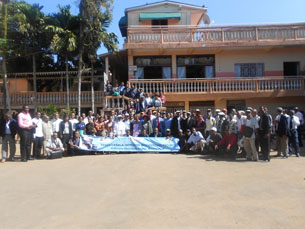ICCO COOPERATION and ONG TANDAVANALA have been working together since 2013 on the “Pro Poor Carbon Market Initiative” project to contribute to CO2 emission reduction and address climate change issues. The tripartite collaboration between ICCO COOPERATION, ONG TANDAVANALA, and FAIR CLIMATE NETWORK has enhanced the existing initiatives to align the project with the carbon market process under the GOLD STANDARD mechanism. To this end, a public consultation involving all project stakeholders was organized. The “Pro Poor Carbon Market Initiative” (PPCMI) promotes energy efficiency technologies to reduce CO2 emissions by decreasing wood fuel consumption in rural Malagasy households, particularly in the Vatovavy Fitovinany Region.
Public Consultation
Since 2014, ONG TANDAVANALA has been studying improved stove models adaptable to the socio-economic, cultural, and environmental contexts of rural areas. After testing various models, ONG TANDAVANALA decided to design a new improved stove prototype. This prototype was tested with 30 households from the corridor forest’s neighboring communes. Following these activities and the methodological requirements of the Gold Standard mechanism, the project entered the public consultation phase, organized on August 20, 2014. This workshop brought together representatives from state agencies, including the Climate Change Directorate and decentralized authorities under Mr. RANDRIAMAROLO Jean Félix, Regional Head of Vatovavy Fitovinany, as well as technical services, development and environmental protection entities. A total of 142 participants attended the workshop.
The goals of the public consultation were to explain the project’s details to participants, encourage their feedback on the project concept, and discuss potential social, economic, and environmental benefits.


Importance of the Project
During the workshop, various information was shared, including wood consumption in the Vatovavy Fitovinany Region, which amounts to 844,692 m³ per year (according to WWF, 2011). This data highlights the need to reduce wood use, despite plans to conduct 10 hectares of reforestation per commune in the region. ONG Tandavanala aims to produce and distribute 80,000 improved stoves in the region to help reduce wood consumption. To ensure household adoption of the improved stoves, the project will introduce a cost-sharing principle, with households contributing a moderate amount of 5,000 Ariary per stove, while the manufacturing cost is around 25,000 Ariary. This funding will be supported through carbon funding mobilization and partnership with ICCO COOPERATION, which pre-subsidizes the project. The use of these 80,000 improved stoves is expected to reduce CO2 emissions by approximately 200,140 tons Equivalent CO2 per year.
Active Participation for Better Results
Discussions during the public consultation revealed strong interest in implementing the “CO2 emission reduction through improved stoves” project. Participants noted that each household could reduce wood consumption, cutting, and budget for wood by 50% with the improved stoves.
Participants recognized the project’s importance and the need for improved stoves, given the current wood availability issues. They were convinced that the project would help regenerate forest cover, improve public health, stabilize the climate, and develop the project region.
However, some concerns were raised regarding the project’s implementation, adoption of improved stoves by farmers, stove durability, and the purchasing power of potential users, generally vulnerable households. Suggestions were made to enhance the stove’s durability and offer various sizes and types. It was also recommended to explore other available energy sources in Madagascar, such as solar energy.



